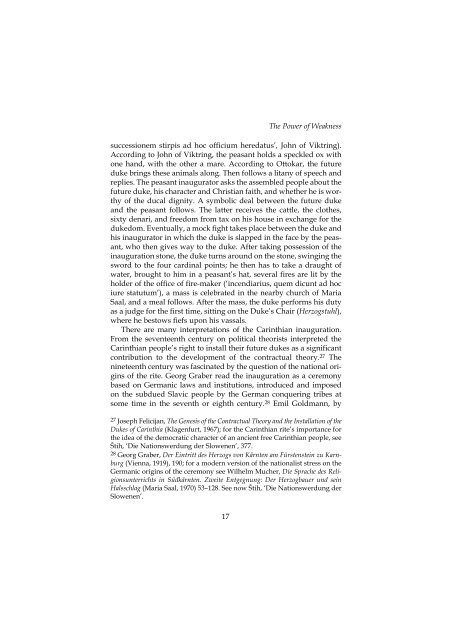The Power of Weakness: Machiavelli Revisited - German Historical ...
The Power of Weakness: Machiavelli Revisited - German Historical ...
The Power of Weakness: Machiavelli Revisited - German Historical ...
Create successful ePaper yourself
Turn your PDF publications into a flip-book with our unique Google optimized e-Paper software.
successionem stirpis ad hoc <strong>of</strong>ficium heredatus’, John <strong>of</strong> Viktring).<br />
According to John <strong>of</strong> Viktring, the peasant holds a speckled ox with<br />
one hand, with the other a mare. According to Ottokar, the future<br />
duke brings these animals along. <strong>The</strong>n follows a litany <strong>of</strong> speech and<br />
replies. <strong>The</strong> peasant inaugurator asks the assembled people about the<br />
future duke, his character and Christian faith, and whether he is worthy<br />
<strong>of</strong> the ducal dignity. A symbolic deal between the future duke<br />
and the peasant follows. <strong>The</strong> latter receives the cattle, the clothes,<br />
sixty denari, and freedom from tax on his house in exchange for the<br />
dukedom. Eventually, a mock fight takes place between the duke and<br />
his inaugurator in which the duke is slapped in the face by the peasant,<br />
who then gives way to the duke. After taking possession <strong>of</strong> the<br />
inauguration stone, the duke turns around on the stone, swinging the<br />
sword to the four cardinal points; he then has to take a draught <strong>of</strong><br />
water, brought to him in a peasant’s hat, several fires are lit by the<br />
holder <strong>of</strong> the <strong>of</strong>fice <strong>of</strong> fire-maker (‘incendiarius, quem dicunt ad hoc<br />
iure statutum’), a mass is celebrated in the nearby church <strong>of</strong> Maria<br />
Saal, and a meal follows. After the mass, the duke performs his duty<br />
as a judge for the first time, sitting on the Duke’s Chair (Herzogstuhl),<br />
where he bestows fiefs upon his vassals.<br />
<strong>The</strong>re are many interpretations <strong>of</strong> the Carinthian inauguration.<br />
From the seventeenth century on political theorists interpreted the<br />
Carinthian people’s right to install their future dukes as a significant<br />
contribution to the development <strong>of</strong> the contractual theory. 27 <strong>The</strong><br />
nineteenth century was fascinated by the question <strong>of</strong> the national origins<br />
<strong>of</strong> the rite. Georg Graber read the inauguration as a ceremony<br />
based on <strong>German</strong>ic laws and institutions, introduced and imposed<br />
on the subdued Slavic people by the <strong>German</strong> conquering tribes at<br />
some time in the seventh or eighth century. 28 Emil Goldmann, by<br />
17<br />
<strong>The</strong> <strong>Power</strong> <strong>of</strong> <strong>Weakness</strong><br />
27 Joseph Felicijan, <strong>The</strong> Genesis <strong>of</strong> the Contractual <strong>The</strong>ory and the Installation <strong>of</strong> the<br />
Dukes <strong>of</strong> Carinthia (Klagenfurt, 1967); for the Carinthian rite’s importance for<br />
the idea <strong>of</strong> the democratic character <strong>of</strong> an ancient free Carinthian people, see<br />
Štih, ‘Die Nationswerdung der Slowenen’, 377.<br />
28 Georg Graber, Der Eintritt des Herzogs von Kärnten am Fürstenstein zu Karn -<br />
burg (Vienna, 1919), 190; for a modern version <strong>of</strong> the nationalist stress on the<br />
<strong>German</strong>ic origins <strong>of</strong> the ceremony see Wilhelm Mucher, Die Sprache des Re li -<br />
gions unterrichts in Südkärnten. Zweite Entgegnung: Der Herzogbauer und sein<br />
Hals schlag (Maria Saal, 1970) 53–128. See now Štih, ‘Die Nationswerdung der<br />
Slowenen’.













